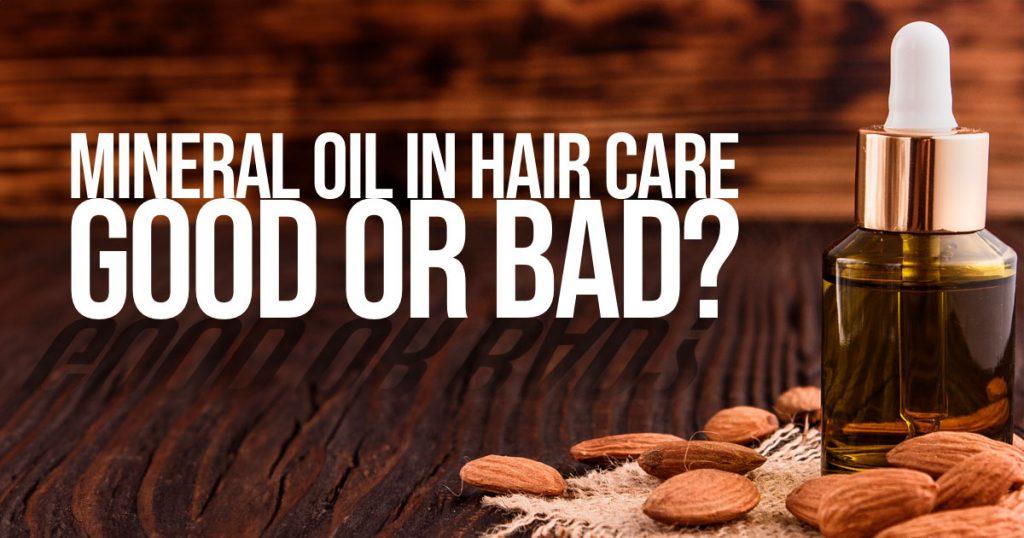When it comes to taking care of our hair, we often hear mixed opinions about using mineral oil. Is mineral oil bad for hair, or is it an unjustly criticized ingredient? Yet, it faces criticism for potentially suffocating the hair and causing buildup. This exploration dives into the myths and facts surrounding mineral oil for hair, evaluates its benefits, and offers advice on how to use it effectively.
What is mineral oil?
Mineral oil, derived from petroleum, features prominently across a range of hair care formulations, from deep conditioners to sleek styling creams. Its main attribute is its capacity to effectively seal moisture within the hair shaft, a property that makes it a common ingredient in products designed to tackle dryness.
Despite its widespread application in the beauty industry, mineral oil’s compatibility with hair health is a subject of ongoing discussion. This clear, odorless oil is known for creating a protective layer over the hair, which can be both a boon and a bane depending on its usage and the individual’s hair type. As it coats the hair, mineral oil acts as a barrier against moisture loss, which is particularly beneficial in harsh environmental conditions.
Mineral Oil for Hair: Justifying the Myths
A lot of what we hear about mineral oil isn’t accurate. Let’s clear up some myths:
Myth: Mineral oil causes hair loss.
There’s no scientific proof that mineral oil causes hair to fall out. It can protect hair by forming a barrier that may reduce breakage and prevent split ends. This barrier protects hair from environmental and styling damage, which can weaken hair and cause loss. Mineral oil also helps keep hair moisturized, promoting overall hair health and reducing the risk of breakage from dryness.
Myth: Mineral oil suffocates hair.
Hair doesn’t “breathe” like skin, so the idea of suffocation doesn’t apply. Mineral oil forms a barrier that locks in moisture, which is great for preventing dryness and protecting against environmental damage. This barrier maintains the hair’s natural moisture balance, making it stronger and more elastic. It can also reduce porosity, helping hair retain moisture and stay hydrated, which reduces breakage.
The Benefits of Mineral Oil in Your Hair
Despite the controversies and myths, mineral oil can still be good for your hair. Here’s why you might want to use it:
Sealing in Moisture
Mineral oil is great for dry or brittle hair. It acts like a super-effective cap, locking moisture into your hair. When applied, it forms a protective layer around each hair strand, preventing moisture from evaporating. This helps to keep your hair hydrated for longer, especially for those with dry or rough-feeling hair. With mineral oil, your hair retains moisture better, feeling softer and healthier.
Fighting Frizz
Dealing with frizzy hair can be frustrating, especially in damp or humid weather. Mineral oil can help. By applying a thin layer, it acts as a shield, preventing your hair from puffing up and becoming frizzy. This makes styling easier and keeps your hair looking smoother for longer, even in humid conditions. Mineral oil can make styling your hair much simpler for those tired of battling frizz.
Adding Shine
If your hair looks dull and lifeless, mineral oil can give it a boost of shine. When applied, mineral oil coats your hair strands, making them smoother and more reflective. This increased smoothness allows your hair to reflect more light, giving it a shinier, more vibrant appearance. It’s like adding a natural gloss that makes your hair look healthier and livelier. With regular use, mineral oil can help your hair maintain a shiny, glossy look.
How to Effectively Use Mineral Oil in Your Hair
Though mineral oil offers loads of uses in your hair, you still need to be knowledgeable on how to use it. Here are some tips you can use when applying mineral oil to your hair:
Using Mineral Oil Wisely
While mineral oil can benefit your hair, it’s important to use it in moderation to avoid buildup. Applying too much can make your hair feel heavy and greasy. Focus on the ends of your hair, where dryness often occurs, to prevent this. Using a clarifying shampoo occasionally can also help remove any buildup, keeping your hair clean and vibrant. Finding this balance lets you enjoy the perks of mineral oil without the buildup.
Choosing the Right Mineral Oil
Not all mineral oils are the same, especially for hair care. Opt for high-quality, pharmaceutical-grade mineral oil for the best results. These refined oils are free from impurities and made specifically for cosmetic use, ensuring they’re gentle on your hair and scalp. Investing in high-quality mineral oil ensures you’re giving your hair the best care possible, maximizing its benefits safely.
Consider Your Hair Type
Understanding your hair type is key when deciding if mineral oil is right for you. For those with very fine or oily hair, mineral oil might weigh it down, making it look flat and greasy. However, those with thick, dry, or curly hair may find mineral oil incredibly helpful. It can improve moisture retention and make hair easier to manage. Tailoring your use of mineral oil based on your hair type can lead to better results, ensuring it works well with your hair’s natural characteristics.
Is mineral oil bad for hair?
Adding mineral oil to your hair routine can bring many benefits, like keeping moisture in, improving how manageable your hair is, and adding shine. But, to get these benefits without any problems, you need to use it carefully. Use only a little, choose high-quality products, and think about what your hair needs.
By doing these things, mineral oil can be a great addition to your routine. It can help your hair look its best and stay healthy and vibrant. Whether you’re fighting dryness, taming frizz, or just wanting shiny hair, mineral oil can be a versatile and effective part of your hair care routine, as long as you use it wisely and for your hair type.
